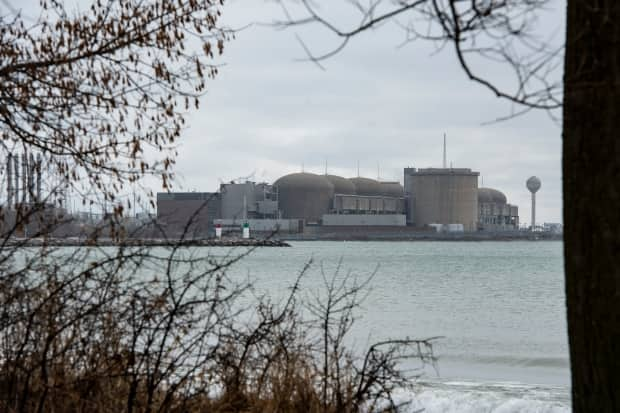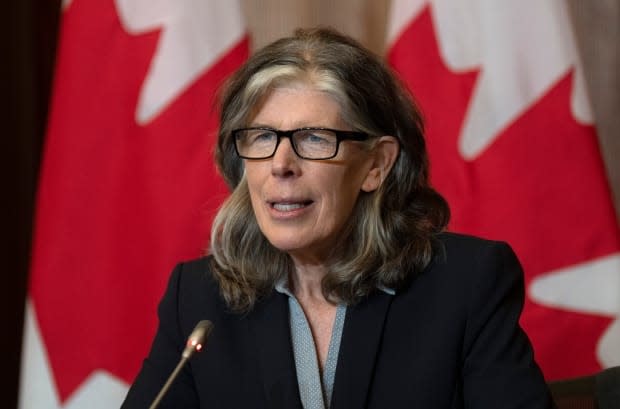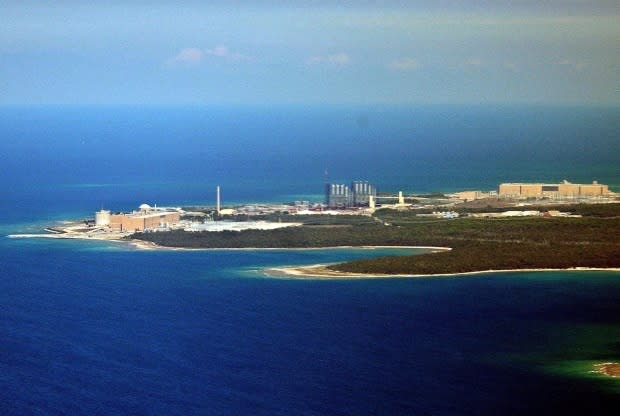MPs and activists push back as Ottawa pitches expansion of nuclear energy

Anti-nuclear activists and a cross-partisan group of MPs urged the federal government Tuesday to drop its support for nuclear energy projects, calling the energy source a "dirty, dangerous distraction" from climate action.
Nuclear power has long been an important part of Canada's energy mix. In Ontario, for example, an eye-popping 60 per cent of the province's power needs are met by nuclear generation — a non-emitting energy source that industry groups and some politicians view as fundamental to the net-zero transition.
Other provinces — notably New Brunswick (which already has a nuclear power plant), Alberta and Saskatchewan — have expressed interest in "small modular reactors" (SMRs), which have been billed as more affordable, less complex and easier to operate than traditional, large-scale nuclear plants.
The International Atomic Energy Agency, a UN-affiliated organization, has said SMRs could be crucial to the clean transition because, unlike renewable energy sources like wind and solar, these smaller nuclear plants don't depend on the weather or the time of day.
SMR boosters also say the technology can help high-polluting, industrial economies ween themlselves off dirtier fuel sources like coal.
But SMR technology is still in its infancy and it isn't widely used around the world.
As of 2022, there were only three SMR projects in operation — one each in Russia, China and India — according to the International Energy Agency.
There are dozens of others under construction or in the design and planning phase — including one at Ontario Power Generation's Darlington nuclear site.

Finance Minister Chrystia Freeland's recent federal budget included a generous tax credit to spur clean energy development, including SMRs.
The industry lobby group, the Canadian Nuclear Association, has said the 15 per cent refundable tax credit is a recognition by Ottawa that nuclear power is "a fundamental and necessary component of Canada's low carbon energy system."
Susan O'Donnell, a professor and a member of the Coalition for Responsible Energy Development in New Brunswick, said Prime Minister Justin Trudeau and his cabinet are getting bad advice about nuclear energy.
"The nuclear industry, led by the U.S. and the U.K., has been lobbying and advertising heavily in Canada, trying to convince us that new SMR designs will somehow address the climate crisis," O'Donnell told a press conference on Parliament Hill on Tuesday.
She said SMRs will produce "toxic radioactive waste" and could lead to serious "accidents" while turning some communities into "nuclear waste dumps."
She also said there's "no guarantee these nuclear experiments will ever generate electricity safely and affordably," since SMRs are still relatively untested.
"Canada is wasting time that must be urgently spent on genuine climate action," she said. "This is a dirty, dangerous distraction. We don't need nuclear power."
Asked how Canada would meet its baseload power requirements — the power that is needed 24 hours a day without fluctuation — without nuclear power or fossil fuel sources like natural gas, O'Donnell pointed to promising developments in energy storage technology.

Liberal MP Janica Atwin was also on hand for the anti-nuclear press event.
"I want to be clear, I'm here as an individual, a concerned individual and a mother," she said — before launching into remarks that raised questions about the "associated risks" and "many unknowns" of nuclear energy development, which is expected to see a sharp increase in activity due to her government's proposed tax policies.
"When it comes to nuclear, there's no margin for error," Atwin said. "This is a time of action. We don't have the luxury of waiting to see if things will pan out."
Green Party Leader Elizabeth May, who once sat in caucus with Atwin before she decamped to the Liberals, said government funding for nuclear projects is a "fraud."
"It has no part in fighting the climate emergency. In fact, it takes valuable dollars away from things that we know work, that can be implemented immediately, in favour of untested and dangerous technologies that will not be able to generate a single kilowatt of electricity for a decade or more," May said.
The SMR that is under construction in Darlington, Ont., is expected to be finished by 2028 — five years from now.
The project's proponents say this SMR, once operational, will deliver 300 megawatts of electricity — enough to power 300,000 homes in the country's largest province.
To address concerns about the reliability of clean energy sources, May said Canada should build a national grid, which could "essentially be a giant battery" — storing excess energy when solar panels and wind farms are producing electricity and feeding it back into the grid when they're not.
In a statement, a spokesperson for the Canadian Nuclear Association said that "Canadians deserve to be told the truth, and the truth is that there is no easy path to net zero for Canada."
"It is disingenuous to suggest that we can easily decarbonize through wind and solar alone, while at the same time doubling or tripling our total electricity demand to 2050," said Christopher Gully.
"Contrary to the statements made today by MP May and others, the changes necessary to support a fully renewables grid in Canada would be absolutely massive, including tens or even hundreds of billions in grid upgrades, fundamental changes to interprovincial power markets, and extremely long timelines for the necessary transmission corridors to be permitted and built. While that may be feasible in a research paper, it is more of a dream than a possible reality."

NDP and Bloc MPs were also on hand for the press conference. NDP MP Alexandre Boulerice said the government's recent support for nuclear power is the result of of heavy lobbying efforts.
He said Natural Resources Canada has somehow been infiltrated by pro-nuclear proponents. "They don't have to knock on the door to get into the house because they own the house," he said.
Federal Environment Minister Steven Guilbeault, who was an environmental activist before jumping into federal politics, has a history of anti-nuclear campaigning.
In 2018, Guilbeault tweeted that "it's time to close Pickering #Nuclear Plant and go for #renewables." Before running for federal office, he was involved with Greenpeace for ten years and was a founding member of Équiterre, two organizations that oppose nuclear energy.
Since his election, however, Guilbeault has been less vocal.
Late last year, he also decided that a proposed small nuclear reactor project at Point Lepreau in New Brunswick will not undergo an extra federal impact assessment.

Speaking at an event Monday in Ottawa with German President Frank-Walter Steinmeier, Trudeau said Canada is "very serious" about reviving nuclear power.
With Canada attracting substantial new industrial development, Trudeau said there's a need for new, cleaner energy sources.
"As we look at what baseload energy requirements are going to be needed by Canada over the coming decades, especially as we continue to draw in global giants like Volkswagen, who choose Canada partially because we have a clean energy mix to offer ... we're going to need a lot more energy," he said.
"We're going to have to be doing much more nuclear."

